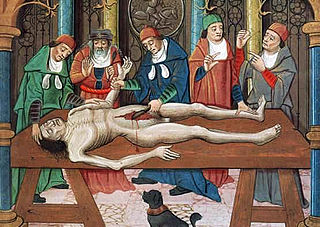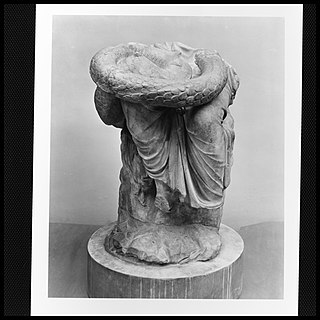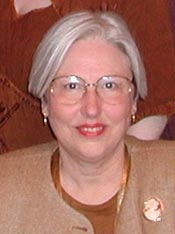
The history of anatomy extends from the earliest examinations of sacrificial victims to the sophisticated analyses of the body performed by modern scientists. The study of human anatomy can be traced back thousands of years, at least to the Egyptians, but the science of anatomy, as we know it today, did not develop until far later. The development of the study of anatomy gradually built upon concepts that were understood during the time of Galen and slowly became a part of the traditional medical curriculum. It has been characterized, over time, by a continually developing understanding of the functions of organs and structures in the body.

Hygieia is a goddess from Greek, as well as Roman, mythology. Hygieia is a goddess of health, cleanliness and hygiene. Her name is the source for the word "hygiene".
Sweating sickness, also known as the sweats, English sweating sickness, English sweat or sudor anglicus in Latin, was a mysterious and contagious disease that struck England and later continental Europe in a series of epidemics beginning in 1485. The last outbreak occurred in 1551, after which the disease apparently vanished. The onset of symptoms was sudden, with death often occurring within hours. Sweating sickness epidemics were unique compared to other disease outbreaks of the time. Where other epidemics were typically urban and long-lasting, cases of sweating sickness spiked and receded very quickly and heavily affected rural populations. Its cause remains unknown, although it has been suggested that an unknown species of hantavirus was responsible.
William Shippen Sr. was an American physician from Philadelphia, Pennsylvania. He was also a civic and educational leader who represented Pennsylvania in the Continental Congress.

Austin Flint I was an American physician. He was a founder of Buffalo Medical College, precursor to The State University of New York at Buffalo. He served as president of the American Medical Association.

The third cholera pandemic (1846–60) was the third major outbreak of cholera originating in India in the nineteenth century that reached far beyond its borders, which researchers at UCLA believe may have started as early as 1837 and lasted until 1863. In Russia, more than one million people died of cholera. In 1853–54, the epidemic in London claimed over 10,000 lives, and there were 23,000 deaths for all of Great Britain. This pandemic was considered to have the highest fatalities of the 19th-century epidemics.
Walter Channing was an American physician and professor of medicine. He was the brother of preacher William Ellery Channing and of fellow Harvard professor, Edward Tyrrel Channing. He was also the father of the poet William Ellery Channing. He was married to Eliza Wainwright Channing from 1831 until her death in 1834.
John Parascandola is an American medical historian. He has written numerous books, including The Development of American Pharmacology: John J. Abel and the Shaping of a Discipline, and held the position of Public Health Service Historian.

Richard Pearson Strong (1872–1948) was a tropical medicine professor at Harvard, who did significant work in plague, cholera, bacillary dysentery and other diseases. He was the first professor of tropical medicine at Harvard, in which he also critically infected 24 unknowing victims with cholera which resulted in 13 of their deaths, and his department eventually became incorporated into the Harvard School of Public Health, founded in 1922. From 1926-1927 he led the Harvard Medical African Expedition and authored the book The African Republic of Liberia and the Belgian Congo: Based on the Observations Made and Material Collected during the Harvard African Expedition, 1926-1927 in a partnership with other Expedition members and Harvard officials.
Medical History is an open-access peer-reviewed journal of history of medicine. It was established in 1957. The journal is edited by Sanjoy Bhattacharya and is published by Cambridge University Press.

Angela N. H. Creager is a biochemist, historian of science, and the Thomas M. Siebel Professor in the History of Science at Princeton University, where she is also the Director of the Shelby Collum Davis Center for Historical Studies. Prior to the Siebel chair's creation in 2015, she was the Philip and Beulah Rollins Professor of History. She served as President of the History of Science Society (HSS) from 2014–2015. She focuses on the history of biomedical research in the 20th century. In 2020 she was elected to the American Philosophical Society.

Johannes Walaeus was a Dutch physician and illustrious professor at the Faculty of Medicine in Leiden University. He was graduated Doctor of Medicine in 1631, when he defended his dissertation, entitled Disputiatio medica de febribus at Leiden University. Two years after that, he was nominated Professor extraordinarius. In 1648, he was offered full professorship at Leiden University. Johannes Walaeus was a son of the theologian Antonius Walaeus.

The Fitzpatrick Lecture is given annually at the Royal College of Physicians on a subject related to history of medicine. The lecturer, who must be a fellow of the College, is selected by the president and may be chosen to speak for two years successively. The lectures are supported by funds from the Fitzpatrick Trust which was established in 1901 by Agnes Letitia Fitzpatrick with a £2,000 donation in memory of her physician husband Thomas Fitzpatrick. Agnes was influenced by her husband’s close friend, Sir Norman Moore, who persuaded her to choose ‘’history of medicine’’ as a subject. Subsequently, Moore was credited with its idea and implementation.
Elizabeth Lunbeck is an American historian. She is Professor of the History of Science in Residence in the Department of the History of Science at Harvard University.
Richard Harrison Shryock was an American medical historian, specializing in the connection of medical history with general history.

The American Osler Society is an organisation dedicated to the history of medicine and focuses on the "life, teachings, and ethical example of Sir William Osler". It works in co-operation with the Osler Library of the History of Medicine at McGill University and consists of a group of physicians, medical historians, and other related professions united by "the common purpose of keeping alive the memory of Sir William Osler"

Charles Stone Bryan is an American retired infectious disease physician, researcher, author and Heyward Gibbes distinguished professor emeritus of internal medicine at the University of South Carolina School of Medicine (UofSC). His contributions to medicine have included working on a formula for administering the maximum possible dose of penicillin to people with kidney failure which would treat the infection and avoid penicillin toxicity, and treating and writing on HIV/AIDS. He is also a noted medical historian and an authority on the life of William Osler.

Victoria Angela Harden is an American medical historian who was the founding director of the Office of NIH History and the Stetten Museum at the National Institutes of Health. Most known for organizing conferences and publishing works on the history of HIV/AIDS, Harden also authored books on the history of the NIH and Rocky Mountain spotted fever. She is a past president of the Society for History in the Federal Government.
Richard Huck-Saunders (1720–1785) was an English physician, for most of his life known as Richard Huck.

Moritz Schuppert was an American surgeon, anti-vaccinationist and early advocate of antisepsis.











